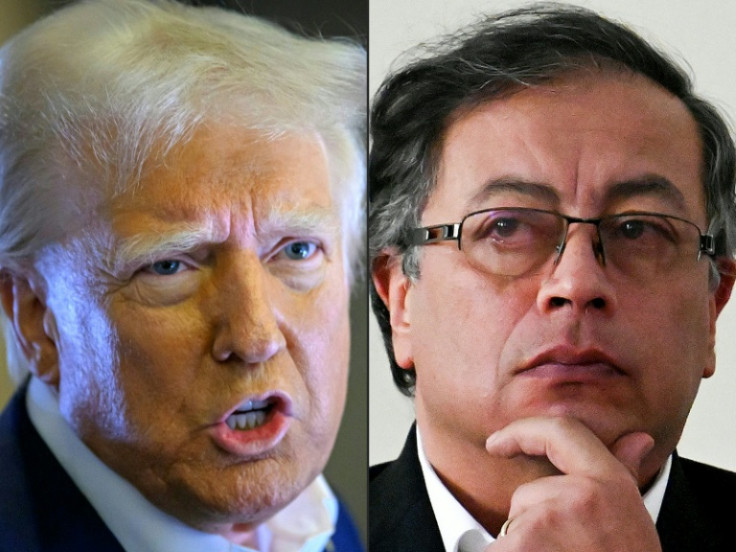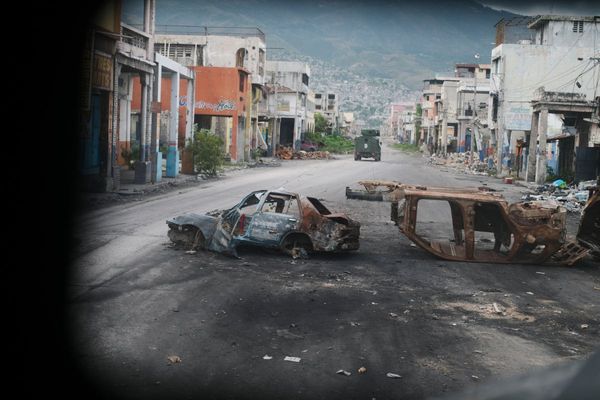
On Sunday, U.S. President Donald Trump announced the suspension of all funds destined for Colombia, accusing the South American country's leader, Gustavo Petro, of being "an illegal drug dealer."
In addition to funding cuts, which could affect crucial security assistance, Trump said he is also preparing to introduce tariffs on the country, which would severely undermine its export economy.
While it remains unclear whether the White House will follow through with his threats, Colombia is bracing for the worst case scenario as relations with its historic ally and largest trading partner reach a new low.
Why is Trump punishing Colombia?
The heated exchange between Petro and Trump over the weekend was one of several bouts in an ongoing war of words between the two leaders.
Since January, when Petro rejected a U.S. deportation flight, the two have clashed on a host of issues, including the war in Gaza and Trump's military build-up in the Southern Caribbean.
Relations further deteriorated on September 15, when the White House decertified Colombia as a drug cooperation partner and laid the blame squarely at Petro's feet: "The failure of Colombia to meet its drug control obligations over the past year rests solely with its political leadership," wrote Trump at the time.
Despite publicly reprimanding Petro, the White House issued a 'national interest waiver' which preserved security funds for Colombia, assistance which is usually cut as part of decertification.
Since then, Petro has antagonized the Trump administration, ramping up his criticism of Washington's support for Israel, which eventually led the White House to revoke his U.S. visa.
In recent weeks he has also accused the U.S. military of killing Colombian citizens in its ongoing bombing campaign against alleged drug boats in the Caribbean. And on Saturday night Petro claimed that a U.S. strike on September 15 killed Colombian fishermen in Colombian waters, accusing Washington of violating his country's sovereignty.
The publication appeared to be the final straw for Trump, who lashed out the following morning against Petro and announced the sanctions.
Security cooperation
A full U.S. funding cut could prove devastating for Colombia's police and military forces, according to security analysts.
"I think that really could send us down a very dangerous road in terms of the internal security in Colombia," said Elizabeth Dickinson, Senior Colombia Analyst at International Crisis Group.
She went on to explain that U.S. assistance is vital to Colombian military operations, not just in terms of funding but also training, intelligence, communications and equipment maintenance.
Colombia received an estimated $230 million from the U.S. in the budget year ending on September 30, according to the State Department, the highest amount in Latin America and the Caribbean.
U.S. military assistance is especially vital at the moment, as the Colombian government fights multiple illegal armed groups who control large swaths of the country. The internal security threat is at its worst level since the 2016 peace deal with FARC rebels, according to Dickinson.
Multiple NGOs, including the International Committee for the Red Cross, have warned of soaring humanitarian challenges, including an 89% increase in victims of explosives last year.
Not only would a full U.S. funding cut undermine the Colombian state's ability to counter the rise of armed groups, it would also deal a blow to U.S. interests in the region.
"The United States also relies a lot on Colombia. Colombia is sort of the tip of the spear in Latin America for the United States," Dickinson told the Latin Times.
The analyst explained that Colombia has been a key U.S. partner in counter-narcotics operations for three decades and that cutting funding to its security forces would hinder Washington's ability to combat organized crime.
Economic impact
In addition to threatening to undermine Colombian and U.S. security goals, Trump's threats potentially pack an economic punch.
A full funding cut would impact U.S. cooperation on regional development projects, according to the Colombian-American Chamber of Commerce (AmCham).
"It would jeopardize social and environmental initiatives that generate employment and stability, and erode the confidence of investors and international partners," Maria Claudia Lacouture, President of AmCham Colombia, told the Latin Times.
While cutting funds would harm the business environment, the specter of tariffs threatens a much more profound economic impact.
On Sunday, Republican Senator Lindsey Graham said Trump was planning to impose tariffs on Colombia. The president confirmed the remarks at a press briefing on Monday.
It remains unclear what duties the White House plans to levy against Colombia, but the country is especially sensitive to U.S. tariffs: 28% of Colombia's exports go to the United States, making it the country's largest trading partner. Goods like coffee, cut flowers and petroleum may be affected by the tariffs.
In response, AmCham's Lacouture warned that regular, working Colombians would be the most affected by the measures, rather than president Petro, whose term expires in August next year.
What could happen next?
People across Colombia are waiting with bated breath to see what comes from the spat between the two presidents on opposite sides of the Caribbean.
Some believe the threats were made hastily and may not hold much water: "So far this is a threat and we don't know the behind the scenes so hopefully none of these scenarios will materialize," explained Crisis Group's Dickinson.
Trump's history of last minute deals to avoid tariffs, which led some Wall Street bankers to develop the TACO acronym ("Trump always chickens out"), leaves some hope in Colombia.
But the personal nature of this dispute, and the White House's proven record of levying tariffs as high as 50% on Brazil and India, give cause for concern.
© 2025 Latin Times. All rights reserved. Do not reproduce without permission.









